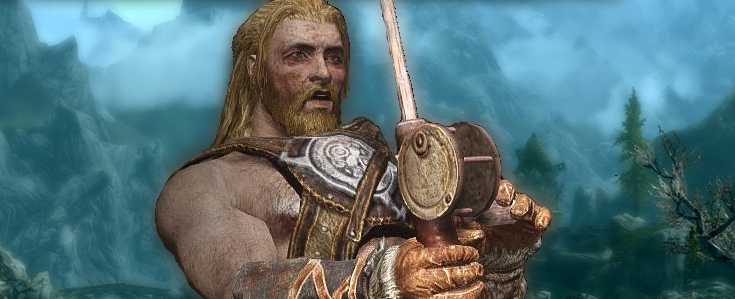Where Valve Went Wrong
 Video game developer and retailer Valve has had a very rough week.
Video game developer and retailer Valve has had a very rough week.
It began with what they thought would be a major boon for players and developers alike as they announced paid mods for the popular game The Elder Scrolls V: Skyrim would be made available over Valve’s Steam game distribution platform. Skyrim had long been one of the most popular game for the modding community and Valve worked tirelessly with Bethesda, the developers of the game, to set up a system through which mods could be legally sold.
But, almost as soon as the announcement was made, a backlash began to grow. Members of the modding community, including developers and gamers alike, began to decry the change and demand that they be removed. A petition against the change became very popular, joke mods began to pop up in the store to protest the move and Gabe Newell, the CEO of Valve, gave an emergency AMA (Ask Me Anything) session on Reddit to address the outcry.
In the end, Valve and Bethesda were forced to backtrack on the project, ending it and refunding money to anyone who had purchased a paid mod. Newell went on to add that the move had been a financial disaster rather than a boon because “Pissing off the Internet costs you a million bucks in just a couple of days.”
But what went wrong? Valve is a company well-regarded as always having its customers interest in mind. How did it misread the community so poorly and find itself in this mess?
To answer that, we have to look at the modding community and why paid mods were doomed to fail from the beginning.
Why Have Paid Mods?
 On the surface, the idea of paid mods seems like a really good one. For games like Skyrim, the modders put in a huge amount of work expanding and improving the game. Mods range from adding new weapons or spells all the way to entirely new campaigns and complete visual overhauls.
On the surface, the idea of paid mods seems like a really good one. For games like Skyrim, the modders put in a huge amount of work expanding and improving the game. Mods range from adding new weapons or spells all the way to entirely new campaigns and complete visual overhauls.
For Bethesda, encouraging the modding community makes sense as it is a big part of why many people buy the game. Also, for both Bethesda and Valve, this is an opportunity to make money directly through a portion of what is paid to the modders.
Most importantly though, it seems like an issue fairness. Given the time and energy that goes into making even a simple mod, it makes sense that modern should be rewarded financially. After all, we don’t expect the core game’s developers to work for free, why should the modders?
Even more interesting, there is some precedent here. Counter-Strike, for example, started out life as a mod for Half-Life but was acquired by Valve and then re-released as its own game. More recently the game Day Z started out as a mod for the shooter ARMA 2 but the developers left it to the community so they could work on it as a standalone game.
However, just because some mods had successfully made the jump to paid games didn’t mean that the modding community was ready to start selling their goods. As Valve found find out, the modding community has a very different set of values, a set that’s incompatible with cash Valve was trying to inject.
Where Things Went Wrong
 For Valve and Bethesda, there’s no one single place that things fell apart. Rather, it was a lengthy series of problems that caused the project to go astray. The problems include (but are not limited to):
For Valve and Bethesda, there’s no one single place that things fell apart. Rather, it was a lengthy series of problems that caused the project to go astray. The problems include (but are not limited to):
- Tone Deaf Regarding Modding: The modding community had operated for years without money changing hands. It was born out of a love for the games as well as a love for tinkering and learning about video game development. Paid mods, to many in the community, are against the spirit of modding.
- Ownership Challenges: Modding is a community that shares a great deal. Graphics, animation, code and more are often shared between mods, often without a formal license or agreement. If a paid mod contains elements from 10 other mods, who gets paid and how much? Also, since many mods have multiple contributors, how do you divide up royalties among them?
- Copyright Infringement: It wasn’t long before the paid mod system and the communal nature of modding led to copyright disputes. Even during the short life of the program, one mod was pulled over reused animations. This was compounded by the fact Valve said that it felt the community would help police its paid mods.
- Low Payments: For every paid mod sold, the developer(s) would only have received 25%. While this amount was set by Bethesda and not Valve, many felt that the amount was unfair, especially considering most app stores pay out about 70%. Even worse a developer had to earn over $100 before they would receive anything, which could be a challenge for those selling $2-$5 mods.
- Selling Air: Finally, many in the gaming community felt that Valve and Bethesda were trying to sell something that is already available for free elsewhere. With a slew of other modding sites, many of which have their own managers and installers, widely available on the Web, Valve stood alone in charging for any mods for Skyrim.
The end result was a great deal of outcry. From modders, gamers and others. It was loud enough to get the program axed in just four days and virtually guarantee no one else will take a chance on such a program for a long, long time to come.
Bottom Line
In the end, what it comes down to is this: Valve did not understand the modding community, its values and its motivations.
While I believe Valve wanted to do something good for modders (not to mention beneficial for Valve and Bethesda), their lack of understanding about the motivations of the modding community would be their downfall.
It was an admittedly rare misstep for Valve, better known for its popular games and heavily-discounted Steam sales, but it is a serious one. Valve could have and should have brought the idea before the modding community, using its own forums if needed, but it doesn’t look like they did. Instead, they worked with modders in secret to launch the project and were overwhelmed by the backlash with their understanding was proved wrong.
So this case should serve as a warning for other companies, make sure you understand a community and its values before you try to inject yourself into it. Failure to do so could see you being treated like a poison rather than a friend.
Want to Reuse or Republish this Content?
If you want to feature this article in your site, classroom or elsewhere, just let us know! We usually grant permission within 24 hours.
